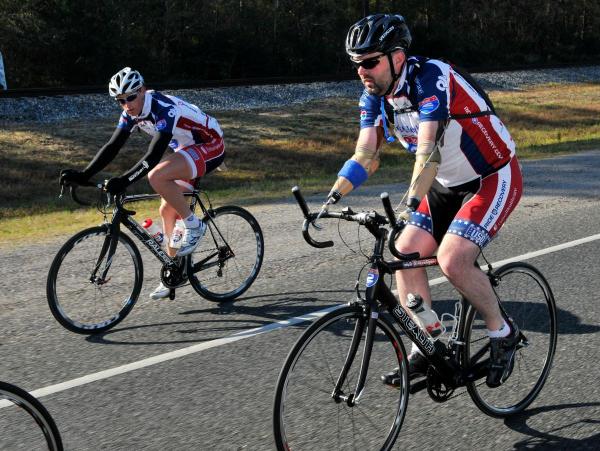DISCOVER YOUR LOCAL BICYCLING COMMUNITY
Find local advocacy groups, bike shops, instructors, clubs, classes and more!
With Liberty and Bicycling for All: Matt DeWitt
Last week, we all celebrated freedom, liberty and justice for all with Independence Day fireworks, parties, parades — and long, leisurely bike rides. In line with the holiday and inspired by the incredible story and call to action Congresswoman Tammy Duckworth (D-IL) shared at the National Women’s Bicycling Forum, the League celebrated the important role bicycling plays in the recovery of wounded warriors in our latest issue of American Bicyclist.
Over the next few days, we’ll share these amazing stories on the blog. Today, meet Matt DeWitt…

When I joined the U.S. Army in 1998, I was not thinking down the road. I was living in the present. In 2003, I was a Calvary Scout, taking part in the initial invasion into Iraq taking Saddam Hussein’s palaces. Then, when patrolling in Khalidiyah a rocket propelled grenade changed my life forever.
I lost both of my arms below the elbow.
After six months of surgeries and rehabilitation at Walter Reed Medical Center, I headed home to New Hampshire to figure out what to do next. But there was one objective in the forefront: to ride a mountain bike again. In high school I was a competitive mountain biker and even won some races, but this was going to be a different ballgame. In November 2011, I was introduced to John Wordin and Ride 2 Recovery (R2R) — and the organization gave me the opportunity to do something that I thought was long gone: the ability to ride a bike again. With an adaptive, carbon fiber, electronic-shifting bicycle, I don’t just ride — I ride fast and push my body to its limits.
Less than two years ago, I set off for my first R2R ride: the Las Vegas Veterans Day Honor Ride. I thought the 40-mile ride on a road bike would be an easier way to get back into cycling and I was right. Getting on that road bike after riding mountain bikes for so long was great. I went out like a rocket — but coming back wasn’t so easy. In fact, Scotty Moro pushed me part of the way back.
That day I decided that no one would have to push me again — and they haven’t.
With electronic shifting and braking modifications, I am able to train at home in New Hampshire and rode the 333- mile R2R Minuteman Challenge in September 2012. After that successful ride, I tried the Newton’s Revenge (mountain) Bicycle Hill Climb on Mount Washington in New Hampshire, the highest peak in New England — and I’ve knocked out a couple of centuries with plenty of hills added in.
Biking has improved my fitness. I’ve lost 30 pounds since that first ride in Vegas and I’ve also met hundreds of new people, from other vets on the Challenge rides and just getting out to ride with my local bike shop.
Traveling around the country, riding my bike hundreds of miles at a time with fellow vets who are dealing with the same kinds of problems, has been very healing. We talk about our time in service and just everyday family issues. It’s such an amazing support group.
Cycling has also provided me with goals to work toward. Last year, I did my first challenge ride, pedaling almost 400 miles from Boston to New Jersey. This year I completed two centuries in three days during the Gulf Coast Challenge. Already, my times on climbs are two to three minutes faster than a year ago.
Now, I’m training with the R2R team for the Leadville 100 — a 100-mile mountain bike event across the high-altitude, extreme terrain of the Colorado Rockies. I’ll be training on the mountains of New Hampshire and then join others on the R2R team a week prior to the race to acclimate to the altitude and test out the race course.
Read more in the July/August issue of American Bicyclist